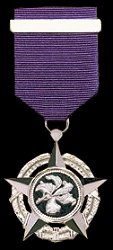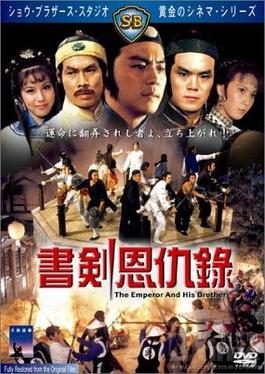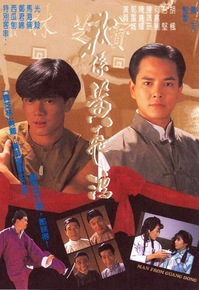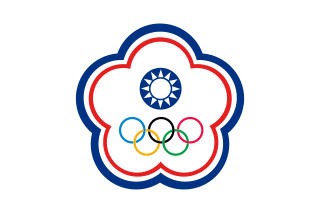Plot
Liu Wen-lung's home is attacked by bandits led by Chou Chao. Liu's wife was killed, but his son Yu-long was saved by a faithful servant by hiding in a well. While tracking down the bandit, his disciple Hu Chi-feng attempted to rape a villager. Liu Wen-lung discovers the attempt and Hu escaped, but not before killing his victim with a killer dart stolen from Liu. Liu Wen-lung adopted Yu-sien, the orphaned daughter of the victim, and raised her together with his son, settling down and giving up the pursuit of vengeance.
Yu-long and Yu-sien grew up together and fell in love. However, Yu-sien ran into Hu Chi-feng, who led her to believe from the dart on her mother's body that it was Liu Wen-lung who killed her family.

Shek Wing-cheung, better known by his stage name Shih Kien, Sek Kin, or Sek Gin or Shek Kin(Chinese: 石堅; pinyin: Shí Jiān; Jyutping: Sek6 Gin1), was a Hong Kong–based Chinese actor. Shih is best known for playing antagonists and villains in several early Hong Kong wuxia and martial arts films that dated back to the black-and-white period, and is most familiar to Western audiences for his portrayal of the primary villain, Han, in the 1973 martial arts film Enter the Dragon, which starred Bruce Lee.

The Silver Bauhinia Star is the second Bauhinia Star rank in the honours system of Hong Kong, awarded to people who have taken a leading part in public affairs or voluntary work over a long period. The award was created in 1997 to replace the British honours system after the transfer of sovereignty to People's Republic of China and the establishment of the Hong Kong Special Administrative Region.
A list of awards given to members of the Hong Kong Civil Service:

The Emperor and His Brother is a 1981 Hong Kong wuxia film based on Louis Cha's novel The Book and the Sword. Produced by the Shaw Brothers Studio, the film was directed by Chor Yuen and starred Ti Lung, Jason Pai and Lo Lieh in the leading roles.

The Twelve Gold Medallions is a 1970 Hong Kong wuxia film directed by Cheng Gang and produced by the Shaw Brothers Studio, starring Yueh Hua, Chin Ping, Cheng Miu, Lisa Chiao Chiao and Fan Mei-sheng.

The Heaven Sword and Dragon Saber is a Hong Kong television series adapted from Louis Cha's novel of the same title. The series was first broadcast on TVB Jade in Hong Kong in 1978.

The Condor Heroes 95 is a Hong Kong television series adapted from Louis Cha's novel The Return of the Condor Heroes. It was first broadcast on TVB Jade in Hong Kong in 1995. Many of the cast from The Legend of the Condor Heroes (1994) reprised their roles in this series, such as Lau Dan and Wayne Lai. In addition, Jason Pai reprised his breakthrough role as Kwok Ching, whom he previously portrayed in The Legend of the Condor Heroes (1976) and The Return of the Condor Heroes (1976).

New Heavenly Sword and Dragon Sabre is a Hong Kong television series adapted from Louis Cha's novel The Heaven Sword and Dragon Saber. The series was first broadcast on TVB Jade in Hong Kong in 1986.

The Heavenly Sword and Dragon Saber is a Hong Kong television series adapted from Louis Cha's novel of the same title. The series was released overseas in 2000 before broadcasting on TVB Jade in Hong Kong in 2001. It has the record for most TVB Best Actress winners, including Charmaine Sheh (2006/2014), Gigi Lai (2004), Michelle Yim (2008), Tavia Yeung (2012), and Kara Wai (2018).

The Return of the Condor Heroes is a Hong Kong wuxia television series adapted from Louis Cha's novel of the same title, produced by TVB. It was first broadcast on TVB Jade from 31 October 1983 to 6 January 1984 in Hong Kong. A total of 50 episodes were produced. The serial was re-aired in 1988, 1990, 1997, 2013, and 2018 on TVB Jade.
The Book and the Sword is a 1960 Hong Kong film based on Louis Cha's novel The Book and the Sword. Directed and written by Lee Sun-fung, the film was divided into two parts, respectively released on 4 May and 9 June 1960 in Hong Kong.
The Duke of Mount Deer is a Taiwanese television series adapted from Louis Cha's novel The Deer and the Cauldron. It was first aired on CTV in Taiwan in 1984.

Rain in the Heart is a 1990 Hong Kong television serial drama produced by TVB and starring Roger Kwok, Dominic Lam, Kathy Chow and Gallen Lo.

The Duel, also known as Duel of the Iron Fist, is a 1971 Hong Kong martial arts film directed by Chang Cheh and starring Ti Lung, Wang Ping, Yue Wai and David Chiang.

The Seven Heroes and Five Gallants is a 1994 Taiwanese television series produced by Chinese Television System (CTS) a few months after its prequel Justice Pao, which was also produced by Chao Ta-shen. Dozens of actors appeared in both series, but only Sze Yu and Tu Man-sheng reprised their roles. Fan Hung-hsuan and Lung Lung chose to portray new characters rather than their iconic roles.

Man from Guangdong is a 1991 Hong Kong martial arts television series produced by TVB and tells the story of Leung Kan, portrayed by Aaron Kwok, the fictitious son of famed martial artist Leung Foon, whom was a favored disciple of folk hero Wong Fei-hung, portrayed by Shih Kien. Shih, who portrayed Wong in the series, was known for portraying antagonists in a series of Wong Fei-hung-related films during the 1940s to 1970s, while the series also features Sai Gwa-Pau reprising his role as "Buckteeth So" from the aforementioned series of films.

Chinese Taipei competed at the 1994 Asian Games in Hiroshima, Japan. This was their 6th appearance in the Asian Games. They won at total of 7 gold, 13 silver, and 24 bronze medals, or 44 medals in total. They improved from the previous Asian Games in 1990, where they won a total of 31 medals. They won the most medals in Judo, where they got a total of 1 silver and 5 bronze.














